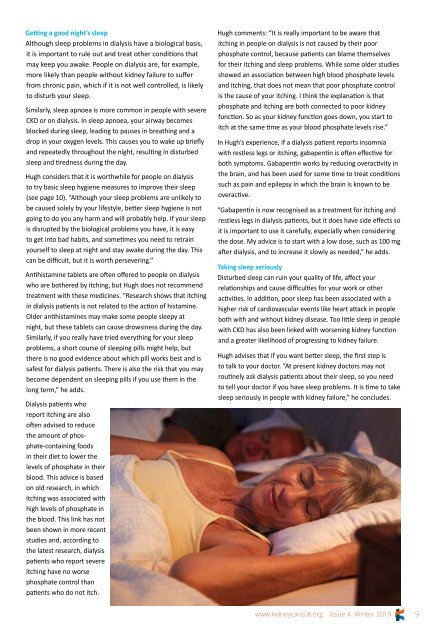You also want an ePaper? Increase the reach of your titles
YUMPU automatically turns print PDFs into web optimized ePapers that Google loves.
Getting a good night’s sleep<br />
Although sleep problems in dialysis have a biological basis,<br />
it is important to rule out and treat other conditions that<br />
may keep you awake. People on dialysis are, for example,<br />
more likely than people without kidney failure to suffer<br />
from chronic pain, which if it is not well controlled, is likely<br />
to disturb your sleep.<br />
Similarly, sleep apnoea is more common in people with severe<br />
CKD or on dialysis. In sleep apnoea, your airway becomes<br />
blocked during sleep, leading to pauses in breathing and a<br />
drop in your oxygen levels. This causes you to wake up briefly<br />
and repeatedly throughout the night, resulting in disturbed<br />
sleep and tiredness during the day.<br />
Hugh considers that it is worthwhile for people on dialysis<br />
to try basic sleep hygiene measures to improve their sleep<br />
(see page 10). “Although your sleep problems are unlikely to<br />
be caused solely by your lifestyle, better sleep hygiene is not<br />
going to do you any harm and will probably help. If your sleep<br />
is disrupted by the biological problems you have, it is easy<br />
to get into bad habits, and sometimes you need to retrain<br />
yourself to sleep at night and stay awake during the day. This<br />
can be difficult, but it is worth persevering.”<br />
Antihistamine tablets are often offered to people on dialysis<br />
who are bothered by itching, but Hugh does not recommend<br />
treatment with these medicines. “Research shows that itching<br />
in dialysis patients is not related to the action of histamine.<br />
Older antihistamines may make some people sleepy at<br />
night, but these tablets can cause drowsiness during the day.<br />
Similarly, if you really have tried everything for your sleep<br />
problems, a short course of sleeping pills might help, but<br />
there is no good evidence about which pill works best and is<br />
safest for dialysis patients. There is also the risk that you may<br />
become dependent on sleeping pills if you use them in the<br />
long term,” he adds.<br />
Dialysis patients who<br />
report itching are also<br />
often advised to reduce<br />
the amount of phosphate-containing<br />
foods<br />
in their diet to lower the<br />
levels of phosphate in their<br />
blood. This advice is based<br />
on old research, in which<br />
itching was associated with<br />
high levels of phosphate in<br />
the blood. This link has not<br />
been shown in more recent<br />
studies and, according to<br />
the latest research, dialysis<br />
patients who report severe<br />
itching have no worse<br />
phosphate control than<br />
patients who do not itch.<br />
Hugh comments: “It is really important to be aware that<br />
itching in people on dialysis is not caused by their poor<br />
phosphate control, because patients can blame themselves<br />
for their itching and sleep problems. While some older studies<br />
showed an association between high blood phosphate levels<br />
and itching, that does not mean that poor phosphate control<br />
is the cause of your itching. I think the explanation is that<br />
phosphate and itching are both connected to poor kidney<br />
function. So as your kidney function goes down, you start to<br />
itch at the same time as your blood phosphate levels rise.”<br />
In Hugh’s experience, if a dialysis patient reports insomnia<br />
with restless legs or itching, gabapentin is often effective for<br />
both symptoms. Gabapentin works by reducing overactivity in<br />
the brain, and has been used for some time to treat conditions<br />
such as pain and epilepsy in which the brain is known to be<br />
overactive.<br />
“Gabapentin is now recognised as a treatment for itching and<br />
restless legs in dialysis patients, but it does have side effects so<br />
it is important to use it carefully, especially when considering<br />
the dose. My advice is to start with a low dose, such as 100 mg<br />
after dialysis, and to increase it slowly as needed,” he adds.<br />
Taking sleep seriously<br />
Disturbed sleep can ruin your quality of life, affect your<br />
relationships and cause difficulties for your work or other<br />
activities. In addition, poor sleep has been associated with a<br />
higher risk of cardiovascular events like heart attack in people<br />
both with and without kidney disease. Too little sleep in people<br />
with CKD has also been linked with worsening kidney function<br />
and a greater likelihood of progressing to kidney failure.<br />
Hugh advises that if you want better sleep, the first step is<br />
to talk to your doctor. “At present kidney doctors may not<br />
routinely ask dialysis patients about their sleep, so you need<br />
to tell your doctor if you have sleep problems. It is time to take<br />
sleep seriously in people with kidney failure,” he concludes.<br />
www.kidneycareuk.org <strong>Issue</strong> 4 <strong>Winter</strong> <strong>2019</strong> 9


















